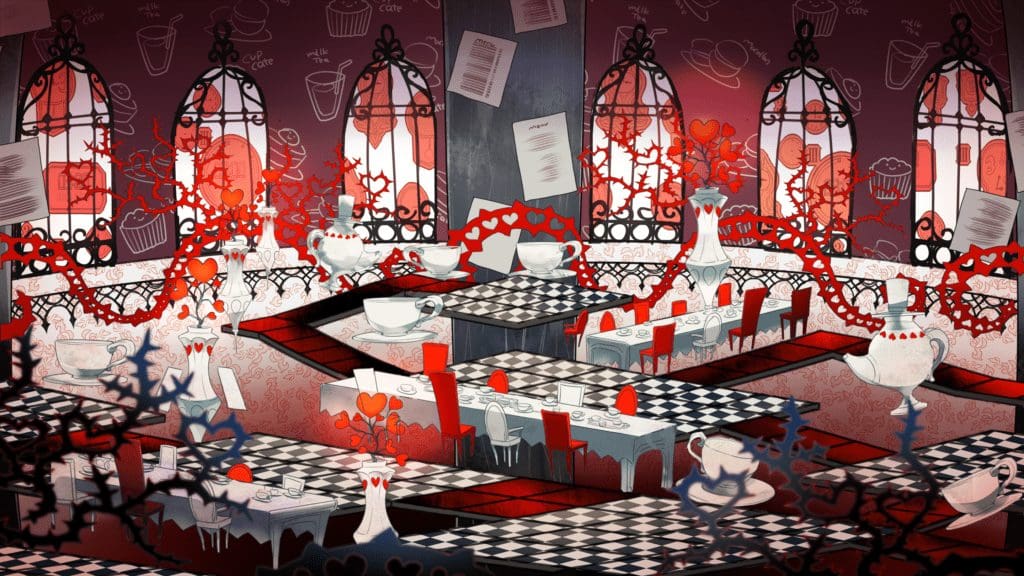With the release of AKIBA’S BEAT for PS4 and Vita alike less than a week away (or just over a week away, if you’re in Europe), we thought it might be nice to take a closer look at the game’s “Delusionscapes” – the dungeons created within the Tokyo district of Akihabara that make up roughly one half of the game’s playtime. Some fans have been unclear as to what these are and how they work, so we figured we’d show you some of the original concept art from several choice Delusionscapes, along with providing thorough descriptions of how each one – and the delusion that spawned it – fit into the game’s setting and overall story.

Audio Delusionscape
For a brief moment in time, Akihabara was an audiophile’s dream, with stereo equipment plentiful and knowledgeable staffers on every corner. But when’s the last time you saw someone excitedly buying a several thousand-dollar boffo stereo setup with amp, subwoofer, big honking speakers, etc.? I’m willing to bet it wasn’t anytime since the turn of the millennium, and Akihabara – its finger ever on the pulse of current technological trends – reflects that, with the audio niche being all but gone from the Akiba streets of today.
One of the central themes of AKIBA’S BEAT, however, is that sometimes, people simply cannot accept change… and in the Akiba depicted here, those who have a strong affinity for the way things used to be can actually change reality to make it that way again.
One music hipster dude, who runs one of the few surviving audio specialty stores in Akihabara, did exactly that, and created this Delusionscape full of the most amazing audio equipment you’ve ever seen (with perfect acoustics, no doubt!). And where did he create it? Why, at the heart of Akiba, of course: Akihabara Station, where all those heading to or from the district inevitably must go. From the outside, it just looks like the station’s got a larger-than-life sound system attached to it, but on the inside, it’s a maze of graphic equalizers and top-of-the-line gear.
The key part of this delusion, however, is the effect it has on the people of Akihabara, unconsciously causing Akiba residents and tourists alike to have a strange desire to go out and buy new audio equipment…

Idol Delusionscape
Cuteness, pinkness, and bunnies rule the day here, as the site of a simple concert fronted by up-and-coming idol singer Riyu Momose turns into an absolute idol paradise. Throngs of adoring (and rather creepy) fans flock to the site, guided to it like a beacon in the night, leaving our heroes with a bit of a conundrum: who among this crowd of hundreds – nay, thousands – could be the “deluser” responsible for dreaming up such a venue?
On the inside, the Idol Delusionscape shares its outer appearance, but dials it all up to eleven with neon color-changing lights and whimsical designs around every corner. One can only imagine the Grand Phantasm (read: boss) that awaits at the end of such a high-energy labyrinth!
The Idol Delusionscape is when the story of AKIBA’S BEAT really starts to kick into gear, presenting players with a large list of suspects as to who might be responsible for its creation, and forcing them to do some true sleuthing in order to find the answer. Is it the jovial yet overbearing Chunk Widebody? The scrawny, sweaty, and devious Twiggy Slims? Or perhaps it’s the shy, awkward Megane Taro, who seems – by all accounts – to recognize that something isn’t quite right about all of this…

Maid Delusionscape
As with the Audio Delusionscape, this one represents a period in Akiba’s history that’s only just now starting to come to a close: the maid boom. Maid cafes are a staple of Akiba culture, allowing reclusive “otaku” (read: nerds) not only to eat lovingly prepared food full of hearts and flowers and frills, but to have cute girls in maid outfits waiting on them hand and foot the whole time, calling them “master” and doing everything in their power to cheer them up with song and dance routines, magic shows, games… whatever it takes!
Maid cafes are still abundant in Akihabara today, with locations like Maidreamin and Granvania serving as landmarks to travelers in the district, and girls in full maid outfits still handing out sale flyers to passers-by on a daily basis. However, if you went back in time only a few years – roughly to the period when AKIBA’S TRIP: Undead & Undressed was released – you’d find maid culture to be more of a dominant force than it is today. In other words, it’s still going strong… but it’s noticeably waning, losing ground to idol culture and other otaku whims.
This is where the Maid Delusionscape comes in. From the outside, it appears as a beacon of maid symbology (frilly lace, rice omelettes with ketchup hearts drawn on them, etc.) at the site of an in-universe branch of the “Maidiators” cafe – and this carries through to the inside as well (albeit with more imagery of bars and chains, suggesting the “deluser” responsible for this delusion might feel a bit trapped). But it’s the effect the maid delusion has on Akiba that’s most noticeable, essentially restoring the maid boom in full… and then some. As long as the Maid Delusionscape exists, maids will be more popular in Akihabara than ever, surpassing their peak numbers from the early-to-mid 2010s. And if that happens… well, it doesn’t sound all that bad, does it? But one could argue that it’ll cause the district to be thrown out of balance, losing its propensity for change. And without that, Akiba just isn’t Akiba anymore!
As such, the Maid Delusionscape chapter is the first time the game’s characters really start to ask: is it right to destroy someone’s delusion, even when it doesn’t seem to be doing any harm? Should delusions be condemned simply for “defacing reality”? Or should they, under certain circumstances, perhaps be embraced?

“Chuuni” Delusionscape
There are numerous Japanese terms that come up so regularly in the anime fandom, they’ve basically become adopted into the worldwide “anime lexicon” at this point. “Baka,” for example, is a word most anime fans know means “idiot,” and “tsundere” is a word most anime fans know refers to someone who’s mean and abrasive on the outside to cover up her (usually her) inner emotionality.
One that doesn’t come up as often, however, but is absolutely key to understanding the story of AKIBA’S BEAT (and is thus left untranslated, but clearly outlined to players during the course of the game, even in the original Japanese), is “chuuni.” Literally “junior high sophomore,” it’s an abbreviated version of the larger slang term “chuunibyou,” or roughly “eighth-grade sickness.” This somewhat derogatory term refers to people who are obsessed with the types of “edgy” things typically associated with fiction targeted toward eighth-graders: large unwieldy swords, characters with mysterious pasts, pretentiously poetic dialogue that obscures the meaning of crucial passages, heroic acts of self-sacrifice, focusing one’s power “over 9000,” etc.
This Delusionscape, then, is fairly low-key and personal compared to a lot of the others in the game. Its effects on the district are minimal, but those who dare to enter it are met with a unique brand of opposition in the form of a dark-cloaked man with a large axe who speaks in riddles. The key to passing by him is solving his riddles, and the key to that is finding the source of the delusion – the person who dreamed up this den of tired anime stereotypes in the first place. But can that be done before the power of the Chuuni Delusionscape collapses in on itself like a neutron star?! Find out next time… on AKIBA’S BEAT!

Electronics Delusionscape
This is one of the more surprising Delusionscapes in the game, I think. When you hear “electronics,” you probably aren’t picturing quite what you get here – verdant green grass and moss, with a general feeling of nature encroaching upon everything around you. How does this relate to electronics? Well, if you look a bit closer, you’ll see: mixed in with all the foliage (indeed, almost camouflaged by it) are air-conditioning units, fans, microwaves, washing machines, refrigerators, and all manner of other home appliances (you don’t actually have to look THAT close in the concept art image, but in-game, these appliances are a bit fewer in number and more well-hidden). These aren’t the electronics that first spring to mind when most of us hear the word, but make no mistake: these are the electronics that made Akihabara what it is today. And here, they’re shown as being forgotten… abandoned… left out for so long that they’re overgrown with moss and vines, likely never to function again.
This is the delusion of someone who controls a vast empire of home appliances, but either regrets that he’s still living in Akihabara’s past, or is afraid his goods will be rendered obsolete by newer, more advanced inventions. It’s the delusion of an insecure store owner – the hidden underbelly of a “home appliance boom” that’s happening on the outside, with people suddenly snatching up home appliances in droves like never before… when in reality, one rarely goes to Akihabara for home appliances these days. The meaning of “electronics” – indeed, of “Electric Town” in general – has changed into a completely different beast over the last few decades. And there are clearly some who would prefer not to change with it, and will fight tooth and nail to keep things the way they once were.
Represented in one of the more emotional chapters of AKIBA’S BEAT, the events surrounding the Electronics Delusionscape hit pretty hard, and may be some of the more memorable and intense moments found in the entire game.
They are also, sadly, very easy to spoil, so I shall speak no more on the subject!

In fact, to talk about any of the other Delusionscapes at this point would be virtually impossible without spoiling crucial story scenes, so suffice it to say we’ve only just scratched the surface here – there are many, many more in this game, each with their own story to tell!
If you could make any delusion into reality, what would your delusion be? Where would it be located, and what effect would it have on your town/city/village/trailer park/biodome? What would the inside of its Delusionscape look like, and what “Grand Phantasm” – representative of the core concept from deep within your soul that spawned this delusion in the first place – would await at the end of it?
We’ve been asking ourselves that very same question here at the XSEED offices, and if you’re lucky, maybe we’ll share a few of our answers with you in a future blog. Because let me tell you, we’re all delusers, baby (though please don’t kill us!).

In the meantime, you can join Asahi & co. on their delusion-filled journey May 16th in North America or May 19th in PAL regions, on PS4 or Vita, both versions containing dual voice and dual text (so you can play with any combination you’d like of Japanese or English voice-acting or text). And in fact, although we previously stated that players would have to download the Japanese voices as free DLC for the Vita version, it turns out we were able to include them as part of the base game after all, so all users on both PS4 and Vita will have all voice and text options in all English-speaking regions, right from the start.
Are you ready to be deluded?

